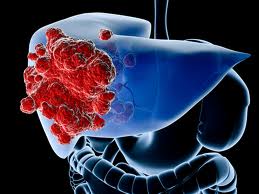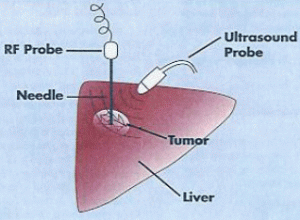
RFA treatment for Liver ancer
Radiofrequency hyperthermic tumor ablation (RFA) is used to treat liver cancer, as well as tumors that have spread to the liver from another part
Radiofrequency ablation therapy has become a major treatment method for small tumors. This technique may offer faster, more targeted liver cancer treatment with fewer side effects and shorter hospital stays compared with standard therapies.
Surgery
Newer techniques are being developed to make both partial hepatectomy and liver transplants safer and more effective.
Adding other treatments to surgery
An active area of research uses adjuvant therapies – treatments given right after surgery – to try to reduce the chances that the cancer will return. Most of the studies so far using chemotherapy or chemoembolization after surgery have not shown that they help people live longer. Some promising results have also been seen with radioembolization, but these need to be confirmed in larger studies. Doctors are also studying ways to make more liver cancers resectable by trying to shrink them before surgery. Studies are now looking at different types of neoadjuvant therapies (therapies given before surgery), including targeted therapy, chemotherapy, ablation, embolization, and radiation therapy. Early results have been promising but have only looked at small numbers of patients.
Laparoscopic surgery
In laparoscopic surgery, several small incisions are made in the abdomen, and special long, thin surgical instruments are inserted to view and cut out the diseased portion of the liver. It does not require a large incision in the abdomen, which means there is less blood loss, less pain after surgery, and a quicker recovery. At this time, laparoscopic surgery is still considered experimental for liver cancer. It is being studied mainly in patients with small tumors in certain parts of the liver that can be easily reached through the laparoscope.
Liver transplant
When it i
Targeted therapy
New drugs are being developed that work differently from standard chemotherapy drugs. These newer drugs target specific parts of cancer cells or their surrounding environments. Tumor blood vessels are the target of several newer drugs. Liver tumors need new blood vessels to grow beyond a certain size.
Radiation therapy
Another potential method of treating liver cancer is radiation therapy . The radiation comes in the form of high energy x-rays that are delivered to the patient only in the areas at highest risk for cancer. These x-rays are similar to those used for diagnostic x-rays, only of a much high energy. The high energy of x-rays in radiation therapy results in damage to the DNA of cells. Because cancer cells are not as good as normal, healthy cell at repairing DNA damage, radiation results in relatively more damage to the cancer cells than to normal cells.
To know more about Liver Cancer Treatment please visit this link https://safemedtrip.com/medical-services/cancer-treatment-in-india/liver-cancer-treatment-in-india.html

 Click to WhatsApp
Click to WhatsApp +91-9899993637
+91-9899993637



